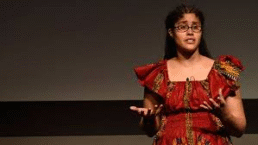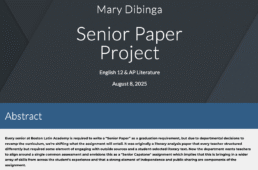
Something essential was grasped at Teacher Institute - something essential about adult learning.
By Abdi Ali, Ed.D
Mary Dibinga, in addition to coaching educators at the Boston Debate League, teaches 10th and 12th grade English at Boston Latin Academy, and when she speaks about WordPowered’s Summer Teacher Institute she attended in July, her words carry the precision of someone who has grasped something essential about how our Collaborative Coaching team designs learning for adults, in the phrase that pulses through her exit interview, “the slowness of it.”
She is describing three days spent with nine other teachers from Boston, Belmont and Lynn, exploring how to teach in ways that respond to students’ cultural and creative needs. What made the institute different was something increasingly rare–time. Time to reflect without targets, to engage without preset answers, yet with clear purpose: to co-create understanding rather than receive it. The slowness she speaks of isn’t laziness or inefficiency; it’s the deliberate pace at which understanding actually forms, like the way photographs develop in chemical baths.
By Day 3 of the Teacher Institute, the scene on the 5th floor of Suffolk University in late July involves adults and young people working on separate projects on the same floor–displaying how learning might naturally occur if we stopped managing it so heavily in classrooms. There is community in shared concentration, in the hum of different minds pursuing different questions in shared space. The youth storytellers participating in Teens in Print flagship program, the Summer Journalism Institute, are absorbed in their own work while educators participating in the Teacher Institute work on their lesson plans nearby for the coming school year, setting up a multigeneration workspace that schools ought to risk creating.
What opens up from Mary’s reflection is a simple radical insight: students don’t need to be doing identical work to be learning together. One student can write an analytical essay while another is writing creatively, both exploring the same concepts but through different literary doors. The learning objectives remain consistent; the paths diverge because the learners choose. It’s the difference between a tunnel and a plaza–both are passageways, but one allows for discovery along the way.
This realization holds real promise. Mary sees the tension between belonging and existing systems, finding ways to navigate institutional expectations while serving what students truly need – when we’re serious about nurturing ambitious learning in everyone. And she offers a way forward that reveals the kind of practical wisdom only collegial conversations can fortify: “leave it open in the middle, and let students select the direction.”
Open in the middle suggests a curricular shape that invites students’ choice and voice while pursuing ambitious goals. Her plan to offer students choices between analyzing literary techniques or demonstrating them in original writing reflects this same principle. Both approaches develop critical thinking and literary understanding; both honor different ways of processing and expressing knowledge. The classroom becomes less like an assembly line and more like a studio where individual learners work toward their own versions of shared goals.
The slowness Mary attributes to WordPowered’s Teacher Institute is about creating conditions where thinking can unfold without being rushed toward quick answers. This is what good teaching has always been: the patient creation of conditions where learning can emerge at its own necessary pace, sustaining both curiosity and community.
In classrooms designed for this kind of learning, students develop not just knowledge but the skills to create knowledge, to trust their own thinking and their take on fundamental human questions. The summer workshops Mary attended seemed to understand something essential about how adults learn that we, at WordPowered, apply equally to teenagers: people bring knowledge and experience into any learning space, and effective teaching begins by recognizing rather than ignoring what’s already there. “This isn’t a group of teachers coming in with nothing,” she notes, recognizing the difference between inputting and awakening what’s already alive.
To learn more about Mary’s work, we recommend checking out her Senior Paper Project.
About Us:
WordPowered (formerly WriteBoston) helps teens find the power in their voice. We equip young people with the critical reading and writing skills they need to express themselves—and to be heard. To expand our reach, we partner with schools and educators to create environments where students feel safe to explore their power. Whether they’re dreamers, writers, musicians, athletes, or still exploring, we help teens discover and strengthen their voices to change their worlds for the better.
Do you want to read more stories from us?
